King Henry VI of England
Henry VI was an on-again-off-again King of England in the 15th Century, suffering through victories and defeats in both the Hundred Years War and the Wars of the Roses. A kind-hearted pious person, he proved wanting as a king in a time when the necessary qualities were usually the opposite. 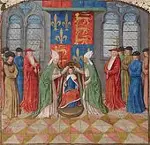
Henry was born on Dec. 6, 1421, while his father, Henry V, was King of England and involved in a long-running war with France. Henry V died when his son was not even a year old, and the infant became technically King Henry VI, on Sept. 1, 1422. The boy's mother was Catherine of Valois, whose father was King Charles VI of France. The French king died on Oct. 21, 1422, and young Henry became nominally King of France as well. The coronation ceremonies did not occur right away. He was crowned King of England on Nov. 6, 1429 and King of France on Dec. 26, 1431. (He is still the only monarch to be crowned king of both countries.) England and France were still fighting the Hundred Years War, and France still had its own king–this dispute over who should rule was one of the sparks of the war, which began in the first half of the 14th Century. Henry's representative to run the English war effort in the early years was his uncle, John, Duke of Bedford. Named as Lord Protector and in charge of the royal council was another uncle, Humphrey, Duke of Gloucester. The English were relatively fresh off Henry V's twin victories at Harfleur and Agincourt and seemed to have the momentum. Bedford found initial success with a devastating victory at Verneuil, and the English army moved on and in 1428 laid siege to Orléans. It was here that one of the most famous names in French history entered the picture. Joan of Arc, a teenage girl claiming to have had religious visions, convinced the Dauphin, in French eyes still the heir to the French throne, to allow her to go to Orléans and join the troops defending the city. She succeeded in rallying the troops and led them in turning the tables on the English, taking the fight to them; as a result, the English army broke off the siege. That trend continued, as the suddenly inspired French pursued the retreating English, winning a smashing victory near the village of Patay; in the rout, French troops captured the English commander, John Talbot, 1st Earl of Shrewsbury. In between Henry's two coronations, England's Burgundian allies captured Joan of Arc, at the siege of Compiègne on May 23, 1431, and sent her to English forces, who quickly tried and convicted her of heresy. She was burned at the stake a week later. As when she arrived on the scene, Joan of Arc cast a long shadow after her death. The English king was still too young to rule in a meaningful way, and so the decisions continued to be left to his advisors, who disagreed on how to proceed. The war was nearing its century mark by this time; and despite a long list of English victories, English armies were not in a position to end the war in their favor. England and France met for negotiations at Arras in 1435 but couldn't agree on terms and so no peace was made. In fact, one of England's key allies–Philip III, duke of Burgundy–changed sides and handed Paris over to the King of France. Later that year, the Duke of Bedford died. Replacing him was Richard Plantagenet, the Duke of York (the father of two later kings, Edward IV and Richard III). 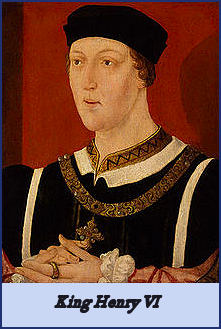
Back in England, Henry VI was much more interested in education. He granted the royal charter for Eton on Oct. 11, 1440, and the royal charter for King's College, Cambridge in February 1441. He himself laid the foundation stones of both buildings and often visited Cambridge to oversee construction. He also had a role in the initial stages of the evolution of All Souls College, Oxford. As well, Henry proved himself much more trusting and perhaps much more naive than his father had been. This Henry liked to believe in the best of people, even in the face of brutal treatment that demonstrated the opposite. He had little of his father's political acumen and none of his father's stomach for war, let alone thirst for glory. He trusted nearly everyone, which didn't help him negotiate among the warring factions that so often plagued his reign. He relied on ministers much older than he was, friends of his father or otherwise, and the number of possible options for the war and the realm were sometimes as numerous as the options open to the king. 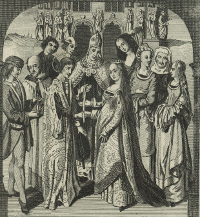
England and France had achieved a brief truce in 1444, and Henry VI had married the French princess Margaret of Anjou on April 23, 1445, at Titchfield Abbey. England broke the fragile truce four years later by sacking lands in Brittany. French advances continued. France retook Rouen and consolidated its hold on Normandy. France besieged the Gascony capital, Bordeaux, on June 30, 1451, only to lose it the following October. Another French victory followed, at the Battle of Castillon, in July of 1453. That was officially the last battle of the war. England still controlled Calais, but that was the extent of its French possessions. Despite all of the battles abroad, Henry VI had little interest in the fighting. He was a kind, gentle person who preferred to spend his days praying and reading the scriptures. His cousin Richard of York had come into conflict with Queen Margaret, she a high-spirited powerful woman and he an ambitious soldier and statesman; and political battles between the two punctuated the middle years of Henry's reign. He had also survived a public uprising at home, beginning with the impeachment in the House of Commons of one of his supporters and ending with an armed rebellion that briefly occupied London by convincing Henry to ride out at the head of an army to put down what he thought was an uprising in the south and then taking advantage of the king's absence by spiriting away and occupying the capital. Henry and his army soon returned and restored order, but the war's dragging on and going considerably worse for England had rubbed raw some anti-royal sentiments that been festering for some time. 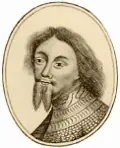
In the same year that the Hundred Years War ended, 1453, Henry had the first of a number of mental difficulties. He descended into a sort of catatonic state. Richard of York (right) was named Lord Protector, over the objections of the queen, who wanted Edmund Beaufort, Duke of Somerset to rule in the king's stead. Also at this time, the queen gave birth to a child, Edward, after having been childless for the first eight years of her reign. Even the birth of a son could not shake Henry from his passive state. His physicians tried everything they knew but could not get the king to move for any length of time. He stared into the distance, not responding to anything around him. Henry's listlessness did not inspire confidence in those who favored him and proved an opportunity for elevation for those who opposed him. One of the most powerful men in the realm at the time, Richard Neville, Earl of Warwick, threw in his lot with Richard of York. York then removed his rival, Beaufort, from the scene by having him arrested and taken to the Tower. The following year, the two men's fortunes reversed, as the king awakened from his torpor and put Beaufort back in power, at the same time relieving York of his. York did not go quietly, and the two powerful men fought against each other, each backed by an army. This was the beginning of the Wars of the Roses. At St. Albans on May 22, 1455, York won a battle, killing Beaufort in the process. An uneasy peace followed. Henry tried his hand at peacemaking, staging Love Day in London, a one-day truce attended by nearly all of the members of both warring factions. Henry's influence and passion for peace was such that he persuaded his wife and York, bitter rivals still, to walk hand-in-hand in a procession from Westminster to St. Paul's Cathedral, while in their wake similar rivals did the same. Nothing seemed to work, and the houses of Lancaster and York found themselves at odds on the battlefield as well as in the courts of politics and intrigue. This was the beginning of the Wars of the Roses. War began in earnest in 1459. Yorkish forces took Henry prisoner in July 1460, after the Battle of Northampton, and forced the king to renounce his own son's claim as heir apparent and instead name York as the one who would next be king. York's victory was short-lived, however. He died on Dec. 31, 1460, at the Battle of Wakefield, which was also a defeat for his army. The queen's forces defeated York's forces at St. Albans in February 1461, rescuing Henry in the process. 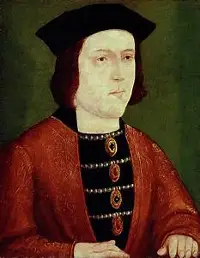
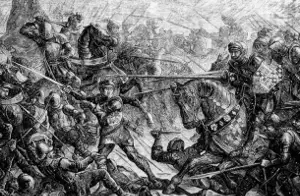
In the meantime, Edward of York (left), Richard's son, had established a power base and had been named king. Still, the two sides fought each other. In one of the bloodiest battles in English history, Edward won an important victory at Towton, on March 29, 1461, routing the Lancastrian forces and removing Henry from power again. The onetime king spent the next few years as a fugitive in Scotland. Henry's supporters found some new hope in a brief uprising in 1464, but he was captured again the following year, and again imprisoned, this time in the Tower of London. After several years of captivity, he once again found himself the King. Edward IV had had a falling out with both his brother George, Duke of Clarence and Richard Neville, Earl of Warwick; both of those powerful men formed an alliance with Henry's wife, Margaret, and a combined force marched on Edward, forcing him into exile. Henry was moved to lavish apartments on Oct. 3, 1470, and celebrated with a royal procession through the streets of London. 
The following April, Edward again asserted his hand, arriving in London at the head of a large force. Queen Margaret, meanwhile, had a force of her own and had landed at Weymouth. Edward succeeded in bringing about Warwick's death at the Battle of Barnet and then crushed Margaret's forces at the Battle of Tewksbury, on May 4, 1471. Henry's son, Edward, who was all of 17, was put to death (or died in the battle, depending on the source), and the queen was imprisoned in the Tower. Henry himself soon followed, and he died on May 21, 1471. He was buried first at Chertsey and then in St. George's Chapel in Windsor, at the direction of Edward's brother Richard. |
|
Social Studies for Kids
copyright 2002–2024
David White




